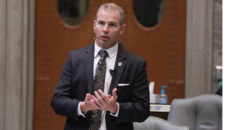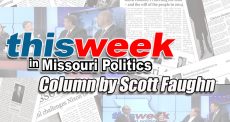Does being shot out of Gussie Busch’s balls qualify someone to be a United States senator? Missouri Democrats will answer that question August 2 when Busch brewery heiress Trudy Busch Valentine faces Lucas Kunce, Spencer Toder and a cast of quixotic vanity candidates for the Democratic nomination.
Valentine’s campaign materials incorporate a heart logo, and the symbolism is fitting. She could have chosen long ago to live off $BUD stock dividends and bond distributions, but instead she became a nurse – long before the profession was about making ChikTok videos and fishing for sympathy on Twitter. She deserves a better fate than being pounded into oblivion by Republican ads in the general election, but that’s the game she signed up for when St. Louis’ old guard ushered her into this race.
There will be many moments this fall the pilsner princess will regret running. She has already been bullied into apologizing for winning a St. Louis debutante ball as a teenager. She gets pilloried each time her team lets her speak her own words at Democratic klatches. She struggles to answer friendly Democrat softballs like, “When did you first begin thinking about getting into politics?” (2:30 mark, if you can handle the cringe.) And she won’t get the kid-gloves treatment from reporters who disagree with her on their pet issues. But even when she’s getting dogpiled on Twitter, what does she care? Why would she possibly need to know what a tweet is? She seems to have a robust life, true friends and she looks like she probably smells nice – three attributes not associated with political social media addicts.
No, most Missouri Democratic primary voters are not Trigglypuffs. Many are working people who wear unironic trucker hats and Walmart jeans (phrase copyright TonysKansasCity.com in the early 2010s, I think.) These men and women don’t start conversations by declaring their pronouns, but they value openness and tolerance and don’t delight in wealth-shaming or gotcha questions about “gender identity.”
So yes, for many primary voters, a candidate with a familiar last name is enough. This is of course

delicious irony for a party in which the shrillest shriekers want to “smash the patriarchy.”
After a few years working as a nurse and decades raising money for charities, Valentine’s campaign for U.S. Senate is a selfless service to the Missouri Democratic Party. By taking the November loss, the sexagenarian spares someone with a bright electoral future from being saddled with the L. In addition to spending millions of inherited dollars, Valentine will raise plenty of cash from out-of-state money marks. This money will in turn be siphoned off by Missouri and D.C. political consultants, staff, strategists, fundraisers, urban “field operators” and other barnacles. It’s a win-win for everyone in the racket, except maybe the naïve Missourians who think their contributions matter and donate money they can’t afford. Hopefully her team will set up a 501 (c)(4), where cash piles can grow like brewer’s yeast in the darkness without pesky journalists following the money.
St. Louis Dems’ swapping out of Scott Sifton for Valentine was a real bummer for Lucas Kunce. He spent more than a year traveling around Missouri in his extra-medium t-shirts trying hard to out-scat Beto O’Rourke. The Media ™ love him, and for good reason – he’s the best interview this side of Republican Billy Long. Missouri’s newsrooms are still majority male (not necessarily men, mind you, but male), and Kunce carries himself like what they aspire to be someday – a guy.
Whether natural or performative, Kunce’s slightly-above-it-all smirk is catnip to journalists and plays well on television. Plus, hacky journos enjoy Dem-on-Dem slander nearly as much as the GOP-on-GOP variety. Kunce will have countless opportunities this fall to do talking-head hits on local D.C. stations and national networks, dumping excretory references atop both parties to the delight of news reporters and podcasting types.
Does Spencer Toder qualify as a vanity candidate? My head says yes, but the place where my heart used to be says no. Toder is by all accounts “smart” – a trait Democrat operatives exceedingly value – so cognitively he registers that he’s not going to win. But polls be damned, he still earns vociferous cheers from real-life and virtual crowds. You can tell he’s spent years actually participating in progressive marches and parades because he doesn’t pose stiffly at odd angles or prance around in coochie-cutter shorts. Toder’s support from high-information activists is evident on social media too. For every retweet the Valentine campaign manufactures from a paid operative, and for every flexed-muscle emoji Kunce gets from thirsty post-walls, Toder earns unsolicited tweets from true believers.
Moving from millennial to octogenarian, there’s John Danforth. After his vigorous fluffing of Josh Hawley just four years ago, I thought Danforth’s electile dysfunction would have kept him from pulling the trigger on a spoiler candidate. Turns out I was wrong, and a person called John Wood has signed on to play the part. This gig is an upgrade of sorts from Woods’ most recent performance, a bit part as Cuckservative #9 in the Dem-Cheney off-Broadway production January 6.
Danforth has signaled he’s willing to spend more than $20 million on the Wood spoiler campaign, which isn’t altogether surprising. Rich old men are known for making unwise “investments” in their twilight years, as evidenced by the existence of Corvette dealerships and the timeshare industry.
It’s hard to imagine a high-dollar attorney sacrificing six months of billable hours for nothing, so I imagine Jowly Wood’s eventual payday was part of the casting negotiations. Of course, if you’re hanging out with a Danforth and a Cheney, your retirement fund is probably already in the low eight figures, so it’s not like Wood is going to have to explain a six-month gap in his resume when he answers a help wanted ad in November.
Danforth’s team, which I’m guessing is comprised of whoever has been granted his power of attorney and various hangers-on, named their PAC “Missouri Stands United” – a brilliant psyop for a campaign vehicle designed to literally divide the state’s vote. In the meantime, John Wood will serve as the nondescript hood ornament on the Danforth DeLorean as the former senator continues his quest to send Missouri back to 1985.
Then there’s the Republican race, in which the primary question has been, “Can anyone stop Eric Greitens?” The mainstream Missouri media certainly couldn’t. Ceaseless attacks from newspapers like the St. Louis Post-Dispatch and Kansas City Star and progressive blogs like Missouri Independent couldn’t flip Greitens from top to bottom. What did make a measurable difference, as Scott Faughn pointed out on This Week in Missouri Politics, was a significant advertising buy from Show Me Values PAC.
Whether the Republican primary or the general election, Missouri voters were never going to send Greitens to serve alongside Josh Hawley in D.C. Can you imagine the tension between those two? Gen Xers who grew up watching Moonlighting know what I’m talking about. One moment Eric is coaching Josh how to run like a man, and before you know it Josh is blowing off work to purchase a bottle of white wine.
Does Mark McCloskey qualify as a quixotic vanity candidate? No, because he could have been in the hunt with a Trump endorsement. McCloskey has begun citing “efforting” metrics (7:10), a telltale sign that a candidate has accepted defeat and wants you to know the campaign’s failure is not for lack of trying. McCloskey touts that he put 95,000 miles on his campaign vehicle, as if President Obama’s Cash for Clunkers program was still around. In McCloskey’s defense, he lives in St. Louis City’s Central Rear End, and we learned from the FBI this summer that urban politicians get sweet deals on auto trade-ins.
But let’s not stray from what I came to say. We focused on Missouri state legislative candidates in part 1 of this series so let’s return there now.
Early-mid August: Post-primary
Since you are running in an unwinnable district, you likely didn’t face primary opponents. This shouldn’t keep you from congratulating yourself on election night via “press release” and social media posts, with the stiff-upper-lip promise that “now the real campaign begins.”
Primary night should be spent calling and texting local, congressional and statewide candidates who lost their elections. This approach was first detailed by Chris Matthews in his book Hardball (sorry fellow right-wingers, that book is a classic.) While everyone else is congratulating the winners, you are thanking the losers for their effort – and asking them to share the voter data they collected. This data becomes your primary asset after you lose in November; we’ll lay out the plan to cash in in Part 3.
The most important thing you can do in the month of August is not knock on doors (it might trigger your “long COVID” and “neuropathy” exacerbated by “extreme temperatures”) or fill out candidate surveys. No, your top priority is attending the Republican and Democratic campaign committee summer caucuses in Branson and Kansas City, respectively.
Companies underwrite these events because they are good corporate citizens and nobly facilitate a vibrant exchange of ideas (they don’t do it to sway votes on the legislation they write, no siree Bob, that would be lobbying.) But a decisionmaker you are not, so all the pressure is off.
Don’t waste your time trying to charm the men and women who run corporate PACs – they have seen vanity candidates come and go each cycle and won’t waste a dime on your campaign. As with Filing Day, your time at the summer caucus should be spent cornering/cajoling/stroking lawmakers and party officials into coming to your district this fall or writing a check. The latter is preferred – if they show up in your district, they will expect to see some semblance of a campaign organization in action.
Retired pro tip: When you arrive at a caucus party or ancillary excursion you haven’t paid for, greet everyone with a humble, “Thank you for having me.” Polite people (most everyone) will reflexively say, “Of course!” and assume someone else invited you.
I know what you’re thinking – your party’s summer caucus is quite a hike from where you live. But the further the better. Like the McCloskey example above, you want to build out your “efforting” metrics now. The round trip to Branson or KC helps pad those numbers.
There’s another bonus to making campaign road trips. Before you head to Branson or KC you’re going to join gas station loyalty programs and earn cash rewards while your campaign fund pays for every visit (fuel, snacks, meals, maybe a gift card here and there.) You’ll list the gas station total on your Missouri Ethics Commission expense reports as “travel” or “gas.” Those receipts that itemize exactly what you purchased – you don’t have them? UGHHH you are SO bad at receipts, aren’t you? The cashier probably didn’t print them out, or the receipt printer was broken and you didn’t want to hold up the line, or whatever.
If you still have a nagging voice tell you this game is illegal (maybe) or unethical (it is) you can rationalize that corporate employees have been racking up travel points and associated rewards on their company’s dime as long as these affinity programs have been around. If corporate fat cats can profit, why can’t a humble #NoCapRepublican or #RootinTootinBootScootinDemocrat like you get in on the action?
Now that we think about it, most modern corporations use expense-report software to effortlessly analyze receipts and flag potential monkey business. I wonder why state lawmakers haven’t equipped the Missouri Ethics Commission with those kinds of tools.
Late August
Your donor-subsidized Branson/KC vacation was a blast, but it’s back-to-school time. Specifically, time to bone up on issues.
Serious public servants focus on issues for which they have relevant expertise or are critical to their constituents. But this campaign is about you, and your ego. How can you cut through the mundane morass of other candidates’ messaging and get more attention on yourself? By choosing your own personal “Pick Me!” issue.
A “Pick Me!” issue is one that shows you’re different than all the other candidates up and down the ballot. Ideally, you’ll identify an issue in which serious people have already got the policy vehicle rolling and you can draft in behind them.
Two I recommend:
Psychedelics as alternative medicine: Rep. Tony Lovasco (R-O’Fallon) has led the charge here, with some Democratic support. Follow Eapen Thampy (which you should already be doing for a multitude of reasons) for the latest on anything in this space. At bare minimum, talking about psychedelics on social media will help you learn who in your area has the best stash.
Cryptocurrency: Why shouldn’t Missourians be able to pay taxes in cryptocurrency? Why don’t Missouri’s 529 plan vendors make crypto ETFs an investment option? Read through Rep. Travis Fitzwater’s (R-Holts Summit) tweets or listen to his audio for deeper practical insight into this space. Or if you’re lazy, just brainstorm all the ways government confiscates your money and then ask why you can’t pay the tab in Bitcoin instead. The tiny group of Missourians who invest in crypto will view you as an ally, and the rest of the public will assume you’re a blockchain expert.
Talking about any “Pick Me!” issue – especially psychedelics and crypto – enables you to cast a wide fundraising net across social media platforms, where out-of-state users won’t know you’re running in an unwinnable district. It also guarantees earned media from local and statewide political reporters, who are tired of hearing Republicans drone on about a “Parents’ Bill of Rights” and Democrats caterwaul about Medicaid expansion. Additionally, you’ll get to invoke the all-powerful archenemy “them” after you lose in November. E.g., “They didn’t like me questioning the pharma lobby,” or, “The banking industry hated me for what I said about blockchain.”
Labor Day
Labor Day events kick off the fall parade season. We’ll talk more about the printing grift in Part 3, but for September parades and lit drops – who does your campaign shirts? If you’ve already got a local shop that will play ball, well done. If not, consider having a family member or friend start their own “printing company.” They won’t have to load a single ink cartridge or learn how to run a Cricut – they just sign up for an account at Wix or a similar virtual storefront and voila, you have found your top vendor! They can create an LLC and get a local business permit within a day or so, and with a minimal web presence will appear legit to untrained eyes.
Note: Credible Democrat candidates in winnable districts will have a hard time pulling off this gambit, as the legit union bug is important to labor loyalists. But unions’ political guys and gals are ruthlessly practical and probably aren’t helping you anyway.
Until next time – keep up those best practices from Part 1 (picking Twitter fights with the opposite party’s leaders, maintaining sock-puppet social media accounts) and get your soft rested hands on as much volunteer/donor data from other campaigns as you can. And in the hardest moments of your me-first ego-driven vanity campaign, remember – it’s always darkest before it goes pitch black.
See you in September!
John Combest began publishing johncombest.com daily in October 2001 to centralize Missouri political news and decentralize truth. His first campaign volunteer experience was in 1994 for a quixotic candidate who lost by 30 points, but as you can tell he’s totally over it. You can reach him at john@johncombest.com, or follow him on Instagram (@johncombest_com) and Twitter (@johncombest_com.) He grew up in Spanish Lake (Hazelwood East H.S.) and lives in Chesterfield.

John Combest began publishing johncombest.com daily in October 2001 to centralize Missouri political news and decentralize truth. His first campaign volunteer experience was in 1994 for a quixotic candidate who lost by 30 points, but as you can tell he’s totally over it. You can reach him at john@johncombest.com, or follow him on Instagram (@johncombest_com) and Twitter (@johncombest_com.) He grew up in Spanish Lake (Hazelwood East H.S.) and lives in Chesterfield.













